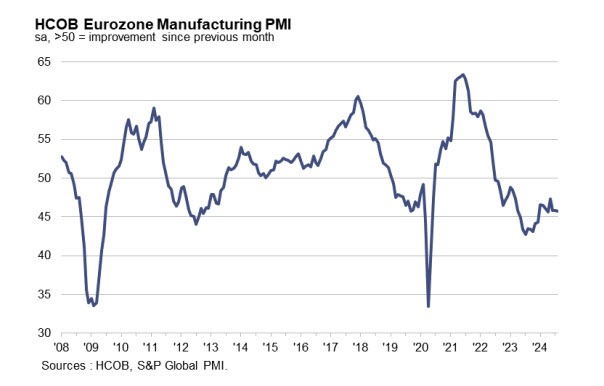
- Prior 45.8
The positive revision is just masking the troubles that are continuing to surface in the Eurozone manufacturing sector. Output continues to suffer while new order inflows fell at the quickest pace this year so far in August. Employment conditions are also starting to be impacted with business confidence sliding to a five-month low. Pain. HCOB notes that:
“Things are going downhill, and fast. The manufacturing sector has been stuck in a rut, with business conditions worsening at the same solid pace for three straight months, pushing the recession to a gruelling 26 months and counting. New orders, both domestic and international, are slowing down even more, dashing any short-term hopes for a rebound. Adding insult to injury, input prices have been creeping up again since June. There is a silver lining insofar as companies managed to pass some of these higher costs onto their customers in August.
“The deflationary phase in the goods sector might be coming to an end. For the first time since April of last year, selling prices rose, driven by France, the Netherlands, Greece and Italy. This could spell trouble for the ECB, which has been grappling with persistent inflation in services while relying on falling manufacturing prices to keep disinflation on track. Higher transport costs are partly to blame for this uptick in price pressure. Although the price increase in goods is still modest, the ECB will undoubtedly keep a close eye on this development.
“Among the eurozone countries in the PMI survey, Austria, Italy and Ireland are bucking the trend. Unlike the others, their indices are actually ticking up instead of down. Italy's Manufacturing PMI was just below the 50 mark, hinting at near stagnation rather than outright decline. Spain isn't far off, barely staying above the critical 50 level, while Greece is still leading the pack. But with such a broad downturn across the board, there is little sign that things will get better anytime soon.”



